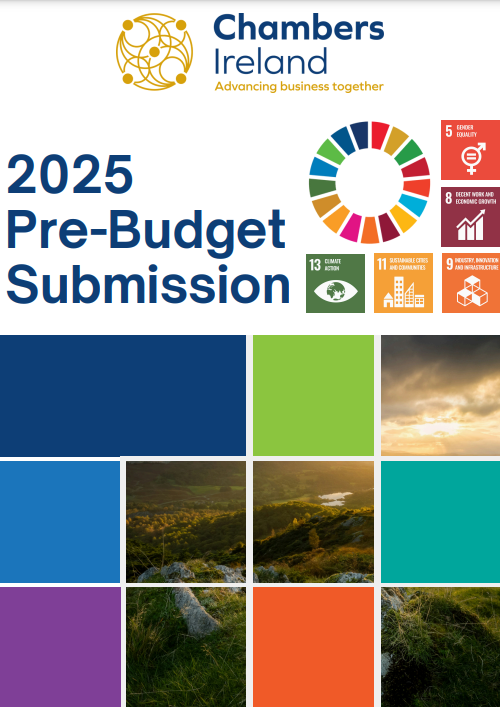Budget 2025 is an opportunity to prioritise infrastructure delivery to boost Ireland’s competitive advantage

Budget 2025 is an opportunity to prioritise infrastructure delivery to boost Ireland’s competitive advantage
Chambers Ireland, the voice of business throughout Ireland, has today (13th July 2024) called for Budget 2025 to be focused on bolstering our national competitiveness for future growth and prosperity.
2024 has been deemed the ‘Year of Elections’ with new representation in our Local Authorities and in the European Parliament, as well as a new constitution of the European Commission, a new Government in the UK and potentially seminal elections in France and the US. We are also awaiting the much-anticipated announcement of the date for the next Irish General Election. With all of this in mind, Chambers Ireland urges the Government to focus on our long-term objectives and invest in sustainable development and essential capital infrastructure.
The last year for businesses has been tumultuous with many SMEs struggling to keep pace with a myriad of financial, administrative and regulatory requirements infringing on business margins and constraining capacity. With a reset at all Government levels, there is now an opportunity to refocus on a coordinated approach to protecting and promoting business growth and development across the country.
Speaking at the launch of Chambers Ireland’s Pre-Budget Submission, Chief Executive Ian Talbot said:
“The Irish population has now been growing consistently for over 40 years and the pace of growth has accelerated in the last 5 years. In spite of that growth, we continue to have one of the lowest population densities in the EU. For too long Ireland settled into a model of falling or low population growth and this has seen the stultification of development that is now proving costly with growth exceeding capacity. As a result, we are now playing catch up with our housing, public transport, water, energy and social infrastructure development needs.
An expanding population gives Ireland tremendous opportunities to foster improved economic and social wellbeing and vibrant, cohesive communities. However, we must ensure that our infrastructure and institutions have the capacity to assimilate this growth and have the capability to take advantage of economic opportunities such as Artificial Intelligence. At this important juncture in Irish politics, the Government have an opportunity to make a strong economic statement by committing crucial investment to our essential infrastructure and making long-term commitments that will serve our future competitiveness. The risk of overheating the economy must be balanced carefully with the social and economic impact arising from not building capacity for the growth we are experiencing and expect to continue.
Our tax base needs to be strengthened and made more resilient, through the broadening of that base, a renewed focus on taxation of resource consumption, not work, and the strengthening of firms in our domestic economy. We would also urge the Government to commit to the robust application of the SME Test to ensure that Budget 2025 and future legislation is fit for purpose and does not impose overly onerous cost and compliance requirements on businesses.”
Some of our other key recommendations include:
- Further investment in childcare (p11)
- Focused deployment of the National Training Fund including in areas such as promotion of lifelong learning, apprenticeship development, investment in further education and intensive language training (p14)
- Supports for parents of children with a disability or additional needs (p16)
- Removalof the €10 million cap on family business transfers (p17)
- Modernisation of all Accelerated Capital Allowances to promote investment by businesses (p17)
- Facilitating SME engagement in International Trade (p18)
- Strengthen and resource planning capability in local authorities and other relevant state agencies, including the courts (p21)
- Accelerate the delivery of keystone urban infrastructure transport programmes such as Metrolink, the Cork Suburban Rail project, and the Dart extension projects (p23)
- A migration plan for the future tax base must be formulated as we transition away from diesel and petrol fuelled cars (p24)
- Accelerate the pace of development and implementation of wind energy generation projects (p33)
-ENDS-
Notes for the Editor:
Chambers Ireland’s Pre-Budget Submission is available to download here.
In accordance with the EU’s stated objective to mainstream the Sustainable Development Goals in the European policy framework, our recommendations are organised in terms of the individual goals they impact. We have outlined the structure of our submission below:
- Gender Equality – SDG 5
- Childcare
- Gender Equality
- Decent Work and Economic Growth – SDG 8
- Developing & Attracting Talent
- Business Supports
- Trade
- Tourism
- Industry, Innovation and Infrastructure – SDG 9
- Planning Reform
- Essential Infrastructure Investment
- Transport Networks
- Fostering Innovation
- Sustainable Cities and Communities – SDG 11
- Housing Development
- Optimise Building Stock
- Modern Methods of Construction
- Vibrant Cohesive Communities
- Climate Action – SDG 13
- Energy Security
- Renewable Energy Generation
- Decarbonisation
